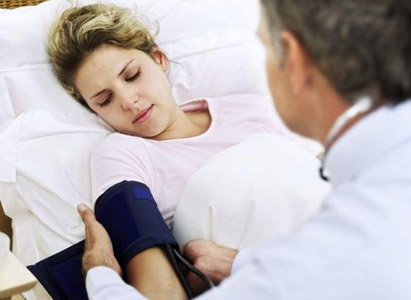Cancer patients undergoing radiotherapy may appear physical discomforts resulted from many local damages such as dizziness, nausea, vomiting. Therefore, good nursing for cancer patients undergoing radiotherapy in every stage is necessary, so that patients can be at ease during this treatment. The required care before, during and after radiotherapy is introduced as following.

Nursing before Radiotherapy
Before radiotherapy cancer patients need to be known the procedure of radiotherapy, so as to avoid getting tense, terrified. Besides, patient should improve general condition, pay attention to nutrition and local condition, avoiding local infection, for example, patients with nasopharyngeal cancer need to flush nasopharyngeal region before radiotherapy; patients with esophageal cancer should avoid eating hard and spicy food before radiotherapy.
Nursing during Radiotherapy
During undergoing radiotherapy cancer patients often develop symptoms such as pain, bleeding, infection, dizziness, loss of appetite, etc. This should be timely solved according to exact symptoms. First of all, physicians should pay attention to adjust treatment plan and the dose, try to protect the region that does not need to be irradiated. At the same time, sedative and vitamin B drugs can be prescribed. Secondly, patients should drink full of water so as to reduce systemic reactions and avoid injury by local radiation. In the course of radiotherapy, physicians should pay close attention to observe changes in blood, if white blood cells are less than 3 × 109/L and platelets lower than 8× 109/L, physicians should timely find the cause or suspend radiotherapy.
Nursing after Radiotherapy
The patient’s irradiated skin should keep clean, avoid physical and chemical stimulus. The irradiated organ is easy to cause secondary infection due to radiation damage and decreased resistance, so nursing and care should be carried out based on different irradiation sites, for instance, patients with irradiated esophagus should eat soft food and patients with irradiated rectum should manage to avoid dry stool. In particular, biopsy generally cannot be performed on the irradiated site of primary tumor, otherwise it will cause wound that cannot heal for a long time.
Nursing for Side Effects of Radiotherapy
In most cases, after radiotherapy patient will appear skin and mucosa reaction, at this time, nurses should do related nursing to ensure the health of patients.
1. Nursing for Skin Reaction
After irradiation, patient’s skin will develop different degrees of skin reactions such as red spot, dry and moist dermatitis. The red spot generally can spontaneously disappear without treatment. Dry dermatitis also does not need to be treated but nurse should pay close attention to skin or use some medication to moist skin or stop itching. The wet dermatitis should take exposure method, avoiding concurrent infection.
2. Nursing for Mucosa Reaction
For oral mucosa, patients can use salt water or mouthwash to gargle. As for the radioactive rhinitis cod liver oil or nasal drops can be used. As for the radioactive laryngitis, steam inhalation can be applied, when necessary, antibiotics can be added into the solution.
*Surgery, in addition to the appropriate chemotherapy and radiotherapy, are effective in treating early cancer, but certain patients in late stage of cancer may not be tolerate surgery well as they can be relatively weak. A combination of carefully planned minimally invasive therapy, chemotherapy or radiotherapy can effectively reduce the side effects and discomfort of treatment and may help patient get better efficacy.













 viber
viber